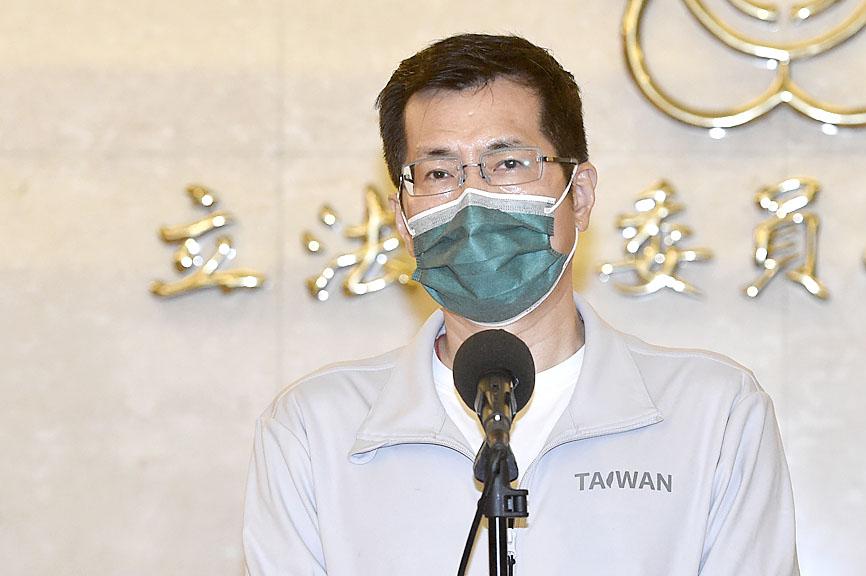Democratic Progressive Party (DPP) Legislator Lo Chih-cheng (羅致政), who had been tipped as the party’s candidate for New Taipei City mayor in the Nov. 26 local elections, pulled out of consideration yesterday, citing delays in formalizing his nomination.
DPP Secretary-General Lin Hsi-yao (林錫耀) on May 3 asked Lo, who heads the party’s International Affairs Department, if he would be willing to be the DPP candidate to run against incumbent New Taipei City Mayor Hou You-yi (侯友宜) of the Chinese Nationalist Party (KMT), a source familiar with the matter said.
Lo, a two-term member of the Legislative Yuan representing New Taipei City’s Banciao District (板橋), yesterday confirmed on social media that he had been asked to take up the challenge against the popular Hou, who is seeking a second term.

Photo: George Tsorng, Taipei Times
However, he has asked the party to rule out his selection, Lo added.
Lo said the party had not officially announced his candidacy, and with less than five months to the election, there is not sufficient time to prepare an effective campaign.
Time was running out for the DPP to mount a productive challenge in the city of 4 million, especially as previous party candidates were given at least six months from their official selection to canvas support across New Taipei City’s 29 districts, Lo said.
“As precious time has been wasted with less than four months until election day, there is no time for New Taipei residents to recognize my sincerity and effort, and that affects my ability to be a mayoral candidate,” he said.
Despite officially selecting candidates for a number of other local elections, the DPP was rumored to be considering its options in New Taipei City, with former minister of transportation and communications Lin Chia-lung (林佳龍), Pingtung County Commissioner Pan Men-an (潘孟安) and Keelung Mayor Lin Yu-chang (林右昌) among the names the party was considering, DPP sources said.

Taiwan is stepping up plans to create self-sufficient supply chains for combat drones and increase foreign orders from the US to counter China’s numerical superiority, a defense official said on Saturday. Commenting on condition of anonymity, the official said the nation’s armed forces are in agreement with US Admiral Samuel Paparo’s assessment that Taiwan’s military must be prepared to turn the nation’s waters into a “hellscape” for the Chinese People’s Liberation Army (PLA). Paparo, the commander of the US Indo-Pacific Command, reiterated the concept during a Congressional hearing in Washington on Wednesday. He first coined the term in a security conference last

Prosecutors today declined to say who was questioned regarding alleged forgery on petitions to recall Democratic Progressive Party (DPP) legislators, after Chinese-language media earlier reported that members of the Chinese Nationalist Party (KMT) Youth League were brought in for questioning. The Ministry of Justice Investigation Bureau confirmed that two people had been questioned, but did not disclose any further information about the ongoing investigation. KMT Youth League members Lee Hsiao-liang (李孝亮) and Liu Szu-yin (劉思吟) — who are leading the effort to recall DPP caucus chief executive Rosalia Wu (吳思瑤) and Legislator Wu Pei-yi (吳沛憶) — both posted on Facebook saying: “I

Sung Chien-liang (宋建樑), who led efforts to recall Democratic Progressive Party (DPP) Legislator Lee Kun-cheng (李坤城), was released on bail of NT$80,000 today amid outcry over his decision to wear a Nazi armband to questioning the night before. Sung arrived at the New Taipei District Prosecutors’ Office for questioning in a recall petition forgery case last night wearing a red armband bearing a swastika, carrying a copy of Adolf Hitler’s Mein Kampf and giving a Nazi salute. Sung left the building at 1:15am without the armband and covering the book with his coat. Lee said today that this is a serious

A mountain blaze that broke out yesterday morning in Yangmingshan National Park was put out after five hours, following multi agency efforts involving dozens of fire trucks and helicopter water drops. The fire might have been sparked by an air quality sensor operated by the National Center for High-Performance Computing, one of the national-level laboratories under the National Applied Research Laboratories, Yangmingshan National Park Headquarters said. The Taipei City Fire Department said the fire, which broke out at about 11am yesterday near the mountainous Xiaoyoukeng (小油坑) Recreation Area was extinguished at 4:32pm. It had initially dispatched 72 personnel in four command vehicles, 16